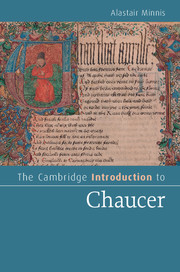Book contents
- Frontmatter
- Contents
- List of illustrations
- List of abbreviations
- Introduction Life and historical contexts
- Chapter 1 Love and lore: the shorter poems
- Chapter 2 Fictions of antiquity: Troilus and Criseyde and The Legend of Good Women
- Chapter 3 The Canterbury Tales, I: war, love, laughter
- Chapter 4 The Canterbury Tales, II: experience and authority
- Afterword
- Notes
- Further reading
- Index
Introduction - Life and historical contexts
Published online by Cambridge University Press: 05 October 2014
- Frontmatter
- Contents
- List of illustrations
- List of abbreviations
- Introduction Life and historical contexts
- Chapter 1 Love and lore: the shorter poems
- Chapter 2 Fictions of antiquity: Troilus and Criseyde and The Legend of Good Women
- Chapter 3 The Canterbury Tales, I: war, love, laughter
- Chapter 4 The Canterbury Tales, II: experience and authority
- Afterword
- Notes
- Further reading
- Index
Summary
Geoffrey Chaucer was born in London, probably shortly after 1340, into a family of prosperous merchants. The Chaucers were upwardly mobile. Geoffrey’s great-grandfather Andrew may have kept a tavern in Ipswich, but his son Thomas became a distinguished parliamentarian and rich landowner, while his granddaughter Alice married particularly well, first to Thomas Montagu, Earl of Salisbury, and subsequently to William de la Pole, Earl of Suffolk. Alice gained some notoriety as an astute wheeler-dealer, who accumulated an extraordinary number of wealthy estates, enjoyed a lavish lifestyle, and shifted her political allegiances when necessary. She sounds like an upmarket version of the Wife of Bath.
Would that we had so much information about the doings of Alice’s grandfather Geoffrey. His life records are sparse, insubstantial, tantalizing. Our first scrap of evidence (dated 1357) names Geoffrey Chaucer as the recipient of a minor benefaction from Elizabeth de Burgh, Countess of Ulster and wife of Prince Lionel, the second surviving son of King Edward III (1312–77). Chaucer was involved in the English invasion of France in September 1359, probably serving in Prince Lionel’s company. He was captured but soon released; King Edward made a modest contribution to his ransom. During the peace negotiations at Calais in October 1360, Chaucer carried letters back to England. Perhaps this marks the beginning of his career as an international emissary.
- Type
- Chapter
- Information
- The Cambridge Introduction to Chaucer , pp. 1 - 11Publisher: Cambridge University PressPrint publication year: 2014



